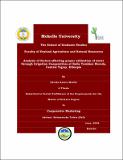| dc.description.abstract | Properly utilize of water is to be cited as one of the crucial problems that threaten to maintain
the subsistence livelihood of the rural people in the study area. Tremendous efforts have been
made by the government to cope up the utilize problem as to increase the status of the
productivity per unit area by incorporating irrigation that could be utilize by individual HH.
When the issue of economic growth and development of the country is raised, one has to take
into account the performance of the smallholder farmers. Reducing the challenges they are
facing and utilizing their potentials can help to accelerate the agricultural sector and economic
development of the country as a whole. Agricultural cooperatives are an ideal means for selfreliance,
higher productivity level and promotion of agricultural development.
Therefore, the major concern of this study is empirically analyzing the factors affecting proper
utilization of water through irrigation cooperatives found in the Kolla tembien district. Both
primary and secondary data were taken for this study. All the irrigation cooperatives the study
area select and a total of 120 sample respondents from kola tembien district. Primary data
pertaining collected from selected respondents through structured questionnaire. The total
respondents, of the cooperative are members for proper utilize of water. Secondary data of the
cooperatives for recognizing irrigation cooperatives.
The descriptive statistics was to analyze the mean difference of continuous and frequency
difference of dummy variables. The Nominal logistic regression model was employed to find
functional relationships between the explanatory and dependent variables by utilization
categories, which were found differently using the irrigation for different purposes. The result
of descriptive statistical analysis showed that, out of the 18 hypothesized variables only seven
variables ( irrigation experience, off-farm income activity , water lifting devices , training ,
vi
slope of the farm ,soil type of the farm and perception of the members ) showed significance
difference at 1% and 5% significant level.
Implications of this study are improving the irrigation cooperatives as well as utilize water of
the irrigation cooperatives to face the challenges in the area especially in irrigation farmers’
produces, increasing the participation of the farmers in the cooperative through provision of
different services and benefits, appropriation of surplus in the form of patronage refund,
increasing the productivity and specialization of the farmers, continuation of distribution of
water to the farmers and above all continuous education and enlightenment of the farmers
about cooperative and its benefits are the utmost priority areas of interventions to improve the
proper utilization of water through Irrigation cooperatives in the area. | en_GB |


